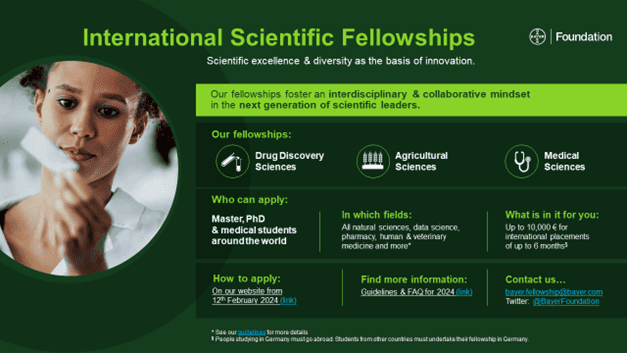NEWS
Stay updated on the latest developments in plant science policy and EPSO activities!
The Bayer Foundation is seeking exceptional young scientists who see collaboration as an opportunity to increase the impact of their research and are seeking to build a global scientific network.
Master & PhD students from all fields of the natural sciences or data science whose research has fundamental or applied relevance to the crop science industry are eligible for up to 10,000 € in funding for an international placement or research projects of up to six months that are complementary to current or future scientific studies.
People studying in Germany must undertake placements in a second country & those studying outside Germany must undertake their fellowships at a German research institution.
The application portal opened 12.2.2024. The foundation also has fellowships available in Drug Discovery Sciences & Medical Sciences.
For any questions, please contact [email protected].
EPSO collaborates with the Bayer Foundation on the 7th international Fascination of Plants Day (FoPD) around 18th May 2024.
Click here to read: Full ‘Jeff Schell Fellowships announcement’
Contacts:
Bayer Foundation
Karin Metzlaff, EPSO Executive Director
EPSO welcomes the position adopted by a plenary vote of the European Parliament on New Genomic Techniques (NGT). The vote was held on the proposal by the European Commission, presented on July 5th 2023, to adopt new legislation regarding plants bred using certain NGTs such as CRISPR/Cas9. According to the proposal, NGT plants will be exempted from European GMO legislation, provided that the induced changes can also be obtained using conventional breeding methods.
The position adopted by the European Parliament raises some uncertainties that should be amended in the upcoming trialogue between the Parliament, the Council and the Commission:
- We strongly suggest legislators not to require specific labelling of NGT-1 plants since these will be essentially identical to plants bred using conventional breeding methods.
- Intellectual Property Rights (IPR) should not be included in the NGT legislation because IPR issues are handled in separate legislation.
- EPSO welcomes that the parliament accounts for the genome size and structure of polyploid plants and other plants with large genomes addressing such complexities in a scientific correct manner and meet EPSO’s concern about the limit of 20 genome modifications specified in Annex I of the draft provided by the EC.
- The complete rewording of Annex I according to the Amendments from the Parliament contains several points that would at least distort scientific findings and the actual breeding process. We therefore strongly recommend essentially retaining the structure and references of Annex I developed by the EC.
With these conditions, EPSO believes the proposed legislation allows a balanced compromise, enabling the development of climate-resilient crops and increased productivity for European farmers. EPSO, therefore, urges the EU member states to promptly come together in support of a scientifically sound and timely NGT legislation.
EPSO identified key components in the legal proposal that should be protected in the Annex Must-protect components of the NGT legislation proposed by the European Commission , 19.01.2024 to the EPSO statement:
- The criteria for determining NGT1 status should be based on similarity to what can be obtained using conventional breeding methods.
- Products derived from NGT1 plants should not be labelled.
- Text on Intellectual Property Rights (IPR) should not be included in the NGT legislation.
EPSO provided detailed comments and suggested a few improvements to the legal proposal in the EPSO statement on the European Commission’s legal proposal …, 06.11.2023. For example:
- The criteria for determining NGT1 should be counted per a basic set of chromosomes.
- Legislation should further enable field trials for scientific purposes.
- NGT1 plants should not be excluded from organic farming practices.
EPSO looks forward to engaging as a major stakeholder with Member States, the European Parliament and the European Commission to achieve a well-balanced regulation. EPSO will continue providing scientific input in the course of the discussions with policy makers and other stakeholders.
Read the full EPSO Comment to the EP vote, 14.2.2024
Read the full EPSO Annex must protect to the statement, 19.1.2024
Read the full EPSO statement to the EC’s legal proposal for a Regulation …on plants obtained by certain NGTs and their food and feed”, 5.11.2023.
Contacts:
Jens Sundström, SLU Uppsala, EPSO Chair WG Agricultural Technologies
Alan Schulman, LUKE / FI, EPSO Chair WG Agricultural Technologies
Odd Arne Rognli, NMBU / NO, EPSO President
Karin Metzlaff, EPSO, Executive Director
The 30th Europe-wide seminar of the series supported by the European Plant Science Organisation (EPSO) and aimed at the Plant Science community and its stakeholders.
TTT: The seminar will be held online each third Thursday of the month at three (CET).
On 15th February 2024 at 15:00 (CET) we will present three talks exploring “Harnessing Photobiology for Future Plants”

Dr Gabriela Toledo-Ortiz, The James Hutton Institute, Dundee, UK: “Tomatoes for tomorrow”

Andreas Weber, Heinrich Heine University, Düsseldorf, Germany: “Natural variation and synthetic improvement of photosynthetic carbon assimilation in land plants”

Roman Ulm, University of Geneva, Switzerland: “Seeing the invisible – UV-B perception and signalling in plants”
The seminars will be hosted on Zoom and last approximately 1.5 hours. Numbers will be limited to 300 attendees and therefore please register early if you would like to join. There will be ample opportunities to ask questions and join the debate. So please join us to support this new and exciting initiative for European Plant Science by following this link just prior to the start of the seminar.
EPSO members register in advance for this meeting: registration link
After registering, you will receive a confirmation email containing information about joining the meeting.
In the coming months we will be on the lookout for talented plant scientists among the EPSO membership to present their findings and perspectives to the EPSO seminar series. If we approach you to talk, we hope you will be happy to support the initiative. This is a fantastic opportunity for both eminent world leaders and talented up-and-coming early career researchers to present their research to an international audience and to network with potential collaborators. If you wish to suggest a theme for one of the upcoming seminars and / or nominate yourself or one of your colleagues to give a seminar, we most welcome your suggestions. Please contact Tim George ([email protected]) to provide your name and potential talk title.
We look forward to seeing you all for the 30th EPSO seminar on the 15th February 2024.
Tim George, Alan Schulman and Marie-Theres Hauser
EPSO Plant Science Seminar Series Organising Committee
Click here to read: Full EPSO news item
Contacts:
Tim George, Hutton / UK & EPSO Board
Alan Schulman, LUKE / FI & Adviser to the EPSO Board
Marie-Theres Hauser BOKU / AT & EPSO Board
EMBO launches a new award: The EMBO Lab Sustainability Award will recognise new and significant contributions to the development of sustainable wet and dry labs with a focus on their environmental impact. The award will be made to an individual representing the initiative or project.
The award winner will have the opportunity to present their initiative or project at scientific events. In addition, the winning project will be supported with a grant of 10,000 euros.
Apply via the EMBO website by 15 March 2024.
Click here to read: Full announcement
EMBO Lab Sustainability Award Link
Contacts:
EMBO call: Philipp Weber, Sustainability Project Officer, EMBO
EMBO / EPSO collaboration: Karin Metzlaff, EPSO Executive Director
The EC proposed to introduce a new classification called NGT, which encompasses genome-edited plants and plants with targeted insertions of new DNA, as long as the DNA originates from the same species or a crossable species. The EC suggest a more relaxed regulation of NGT plants compared to traditionally genetically modified organisms, provided that the genetic changes introduced are similar to those obtained using conventional breeding methods.
Since then, negotiations among the Member States and in European Parliament have introduced several possible amendments to the original legal proposal put forward by the European Commission. Some of the changes threaten the utility of the proposal for improving the current legislation. EPSO has therefore identified key components in the legal proposal that should be protected:
- The criteria for determining NGT1 status should be based on similarity to what can be obtained using conventional breeding methods.
- As long as modifications introduced using NGT are similar to modifications created by conventional breeding methods, EPSO sees no need for criteria based on a risk assessment.
- Products derived from NGT1 plants should not be labelled.
- Text on Intellectual Property Rights (IPR) should not be included in the NGT legislation.
EPSO provided detailed comments and suggested a few amendments to the legal proposal in the EPSO statement on the European Commission’s legal proposal for a Regulation of the European Parliament and of the Council on plants obtained by certain NGTs and their food and feed…, 06.11.2023. For example:
- The criteria for determining NGT1 should be counted per a basic set of chromosomes.
- Legislation should further enable field trials for scientific purposes.
- NGT1 plants should not be excluded from organic farming practices.
EPSO looks forward to engaging as a major stakeholder with Member States, the European Parliament and the European Commission to achieve a well-balanced regulation. EPSO will continue providing scientific input in the course of the discussions with policy makers and other stakeholders.
Read the full EPSO Annex to the statement, 19.1.2024
Read the full EPSO statement to the EC’s legal proposal for a Regulation of the European Parliament and of the Council on plants obtained by certain NGTs and their food and feed, 5.11.2023.
Read the summary that was submitted to the EC consultation on 5.11.2023 [Feedback reference F3442539].
Contacts:
Jens Sundström, SLU Uppsala, EPSO Chair WG Agricultural Technologies
Alan Schulman, LUKE / FI, EPSO Chair WG Agricultural Technologies
Odd Arne Rognli, NMBU / NO, EPSO President
Karin Metzlaff, EPSO, Executive Director
The 29th Europe-wide seminar of the series supported by the European Plant Science Organisation (EPSO) and aimed at the Plant Science community and its stakeholders.
TTT: The seminar will be held online each third Thursday of the month at three (CET).
On 18th January 2024 at 15:00 (CET) we will present two talks exploring the “Potential for the use of cell omics in plant science”

Stefania Giacomello, KTH Royal Institute of Technology, Stockholm: “Transcriptomics profiling using barcoded microarrays”

Jörg Becker, Instituto de Tecnologia Química e Biológica António Xavier (ITQB-NOVA), Oeiras, Portugal: “Insights into sperm cell development using single-cell type transcriptomics”
The seminars will be hosted on Zoom and last approximately 1.5 hours. Numbers will be limited to 300 attendees and therefore please register early if you would like to join. There will be ample opportunities to ask questions and join the debate. So please join us to support this new and exciting initiative for European Plant Science by following this link just prior to the start of the seminar.
EPSO members register in advance for this meeting: registration link
After registering, you will receive a confirmation email containing information about joining the meeting.
In the coming months we will be on the lookout for talented plant scientists among the EPSO membership to present their findings and perspectives to the EPSO seminar series. If we approach you to talk, we hope you will be happy to support the initiative. This is a fantastic opportunity for both eminent world leaders and talented up-and-coming early career researchers to present their research to an international audience and to network with potential collaborators. If you wish to suggest a theme for one of the upcoming seminars and / or nominate yourself or one of your colleagues to give a seminar, we most welcome your suggestions. Please contact Tim George ([email protected]) to provide your name and potential talk title.
We look forward to seeing you all for the 29th EPSO seminar on the 18th January 2024.
Tim George, Alan Schulman and Marie-Theres Hauser
EPSO Plant Science Seminar Series Organising Committee
Click here to read: Full EPSO news item
Contacts:
Tim George, Hutton / UK & EPSO Board
Alan Schulman, LUKE / FI & Adviser to the EPSO Board
Marie-Theres Hauser BOKU / AT & EPSO Board

